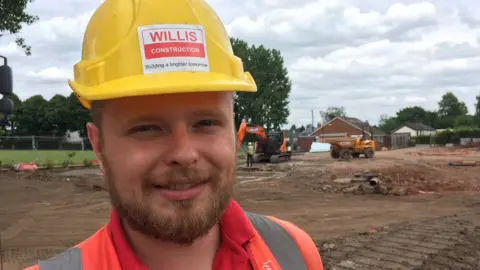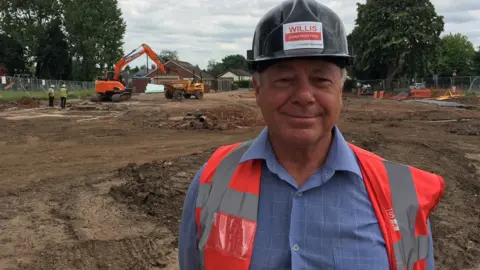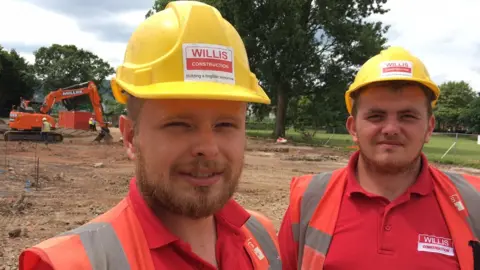Deaf construction worker's 'demoralising' job hunt
Jack Griffiths is one of about 84,000 deaf people in the Welsh workforce. But the 25-year-old builder from Tredegar, Blaenau Gwent, suffered numerous knock-backs before landing a job and he has had to overcome the challenges of working on a building site without hearing. He tells his story.
I was profoundly deaf when I was born.
I went to school in Cwmbran - a mainstream school for the hearing and deaf - but my parents were trying to find somewhere that was good for me.
I was a clever child but nothing was fitting my needs here in Wales, so I made the decision to go to Derby, to the Royal School for the Deaf.
I've always loved making things. Wood, plaster, making things with my hands, so I naturally progressed into the construction industry. My dad is an electrician, but I wanted to do building.
As I got older I spent more time in Derby and I went to college, where I did bricklaying, and then I did more qualifications.
Then I went to Nottingham, where I passed my plastering qualification and I was keen to continue in Derby, but I couldn't carry on studying.
So, I moved back home to Wales, where I wanted to do more qualifications and I started looking for a job.
It was really difficult.
I had interviews but failed because of the "risk levels" - I wasn't sure what the problem was.

I felt that I was well qualified, it should be easy. But I realised quite quickly how hard it would be. I'm confident but I couldn't change their view of a person who is deaf and their preconceptions.
It wasn't me being scared about getting into the world of work. It was them being scared of me working for them - people who didn't understand what it was about. I realised I needed help.
I felt my confidence ebbing away. I started getting worried about my future. I thought, what happens if I can't get work?
Nobody was keener to get into work than me. And when you hear "no" all the time, the constant disappointment - it becomes a hard struggle to keep on applying.

Find out more
Jack's story on BBC Radio Wales' Eye on Wales programme
Action on Hearing Loss have information about support services for people who are deaf or have hearing loss

There were times when I wanted to give up. I kept saying to myself, "don't give up, keep fighting, you will get a job, somebody will give you a job". I knew I had to try my best. I had to keep going.
I'd be talking to people but I found myself drifting away - my concentration was lacking.
'Huge amount of thanks'
When I first met Matt Skinner [an employment adviser at Action for Hearing Loss Cymru] it did change. Before I met him, emailing and using the telephone was difficult.
Matt's support changed the way I was doing things. A hearing person who could contact people on the phone, could help me with English. It helped a lot.
Things improved from then on. I owe him a huge amount of thanks.
I was offered a job with a one-year contract and I was happy to take that. I enjoyed it but the contract ended and was not extended.
So, it was time to look for more jobs.
It went on for a year or two - no job - and it was demoralising hearing "no" all the time. It affects you.
Then Matt got in touch about Willis Construction in Cardiff. I'd never heard of the company. I was expecting the same again - I was expecting a fail.

When Matt said the health, safety and training manager Paul Cachia wants to meet you, I thought "OK". I immediately recognised that he had a level of respect and understanding about disability.
He was very welcoming. We had a chat and I realised he was really different to everyone I met before. I really liked him.
He told me straight away [I had the job]. I was surprised. I asked him: "Aren't' you going to give me an interview?"
"No, I can see your certificates," he said. "I can see how qualified you are, you just need the chance."
When I first started I had an interpreter so the boss was able to talk to me. The first time I met Adam Bruton, my colleague who I now work with, I was awkward and apprehensive, with stumbling communication. It improved to the smooth communication we have now.
It's a natural relationship. Adam does all the phone calls, I do the driving. Adam meets the site boss and chats about the day. He then explains it to me and I get on with the job. We help each other through the day.
In work on an everyday basis, I communicate by texting, gestures, body language, for instance, digging with a spade - just a natural gesture communicates that. Some people I can lip read. Also - easy things - pointing and validation. It all works nicely.

Sometimes there are mistakes but we get there in the end. Sometimes I feel I'm frustrating people or wasting their time - that's just normal.
Some of the companies that I was interviewed by in the past, we have dealings with.
In a way, I wish I could go to people and say: "Look at me, I'm working here and there's been no mistakes, no problems, no risks. It's a smooth working environment."
I want to show people, I want them to say: "Oh, you're the deaf person, we interviewed you and turned you down because you're deaf."
I want them to realise that I can do it. Deaf people just want the same opportunity. We want people to be deaf aware. We want them to realise that we can do things.
